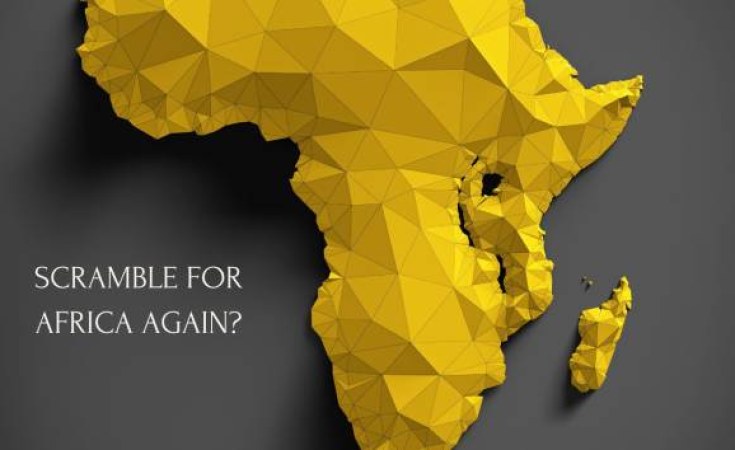Abuja — Not all wars are fought on the battleground. The Cold War has taught us that certain wars could go on for decades, without overt violence. Perhaps, we are in the middle of another one with China as the new rival to the United States of America. This time, the 'battlefield' is Africa.
This Voice of America article speaks on how China is already outpacing the U.S. in its relations with the continent. New York Times cites loans provided by the Chinese government to several African nations and investments such as hospitals, transportation infrastructure and stadiums already dotting the African landscape.
Similarly, we all know of how the United States has heavily supported many countries in Africa through trade and in the fight against insurgency; putting boots on the ground, supplying top-grade artillery, training security agencies etc.
Why would nations so far removed make decisions for a whole continent? Why does Africa have to be a pawn in a scheme that it has no business with? Why is there even a conversation about strengthening relations with Africa on the basis of having an advantage over another nation?
There is no point in rehashing the dysfunctional relationship Africa has had with... hmmm, what's the right term? The global north? Developed nations? Let's just say 'richer nations'.
Also, there is no need to debate how that wealth came to be. The point is that Africa has, for the longest time, depended on wealthier nations for humanitarian aid and oftentimes, this aid always comes with strings attached.
Recently, I was at an event organized by Devex where Congresswoman Sara Jacobs spoke on US-Africa relations. She made very valid points about how the United States has, over the years, used a carrot-stick approach with the continent, dangling humanitarian aid for alignment with the United States policies and ideologies and sanctions for derelictions (my words, not hers).
She highlighted the positive impact of some of these policies like the African Growth and Opportunity Act (AGOA), which I had not heard of prior to her mentioning it but has yielded interesting returns for Nigeria and the U.S. She went on to caution against the U.S limiting diplomatic relations with Africa to a strategic competition to simply be one-up over China.
Then she said something that got me thinking really hard. She talked about the United States giving Africa agency. In fairness to her, I do not remember the full statement she made and her points of view were largely refreshing to hear but my mind went off on a tangent, pondering a question, "Will the USA ever really accept Africa's agency, even when we do not agree with them?"
The truth is that Africa does not need any country or 'superpower' to give it agency. Absolutely not! Africa is made up of sovereign nations who already have agency and while these nations may not act like it as they go cap-in-hand seeking foreign aid, this is a fact.
All of this made me wonder if it was 1884-1885 all over again- the Berlin Conference that ended with the partitioning of Africa and rules for its conquest.
Why would nations so far removed make decisions for a whole continent? Why does Africa have to be a pawn in a scheme that it has no business with? Why is there even a conversation about strengthening relations with Africa on the basis of having an advantage over another nation?
The goal of this article is not to point accusatory fingers at the United States or China. After all, some of these humanitarian efforts have truly improved certain communities, albeit at a great cost. More so, as our people say, when you point one finger, the others point back at you. What have our leaders done to reposition the continent? How has the continent looked inward to build itself?
The questions abound but I believe this is the start. There are so many development organizations in Africa, but how many of them are thinking of systemic change rather than merely providing direct service?
Do not misunderstand me: direct service is important in bridging immediate gaps to improve the quality of life in various communities. Nonetheless, if we are going to initiate long-term change then we should be thinking of systems change, policy advocacy, looking at the big picture and laying the building blocks for posterity.
Irrespective of the sectors you may be working in- governance, health, education, environment etc.- as you provide services for the 'now', you must also have a bird's eye view of how to improve your community for the long run and eliminate the factors that perpetuate the status quo.
With the expertise you have in your local context, you should be the one directing even international grantmakers on how best to engage communities. This is the concept of localization, that I wrote about here. This is why collaboration and coalition-building in the development space is important. Development work is not a competition even though grantmaking has made it seem that way.
Ultimately, Africa needs to stand up for itself. There is no one coming to save us. Otherwise, we will sit by, twiddle our thumbs and find ourselves back in 1884.
Angela Umoru-David is a creative social impact advocate whose experience cuts across journalism, program design and corporate/development communications, and aims to capture a plurality of views that positively influence the African narrative


